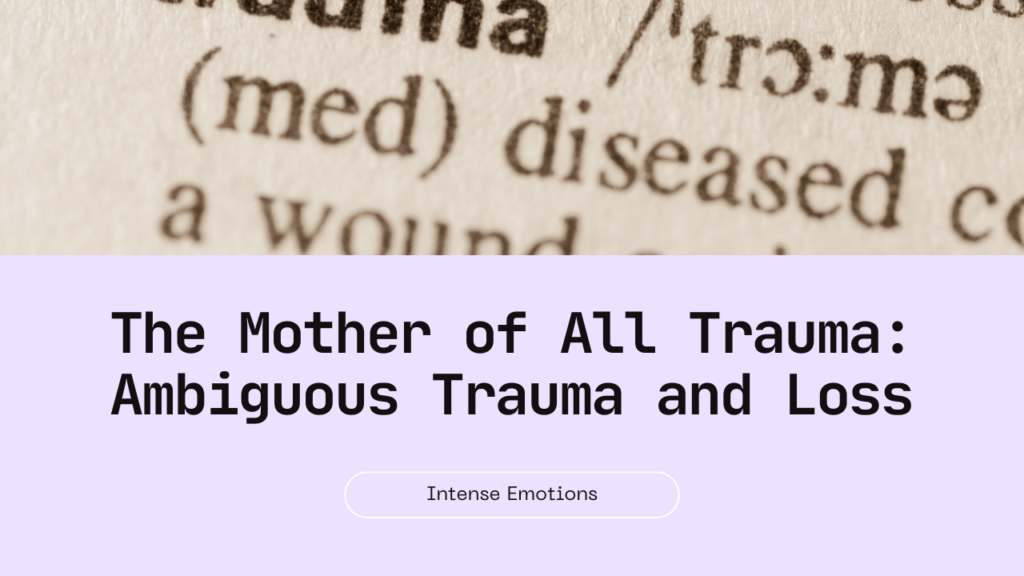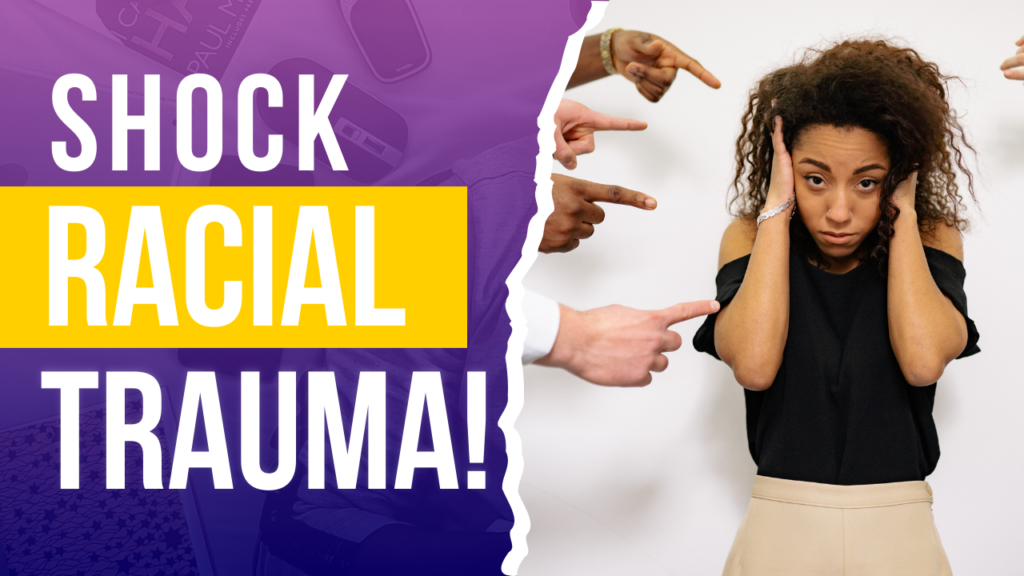
Powered By BlackTraumaGPT.com
Researched and Curated By Rev. Dr. Philippe SHOCK Matthews
(Black Trauma and Mental Health Specialist | Prompt Eng | GPT Dev | Research Scientist | Africana Phenomenologist | Black AI Corsortim co-Founder)
Ambiguous Trauma and Loss: Navigating Uncertainty in the Face of Grief
Loss is an inevitable part of the human experience, a universal thread that weaves through the fabric of our lives. However, not all losses are created equal. While some griefs are clear-cut and widely recognized, others lurk in the shadows of uncertainty, defying easy categorization and resolution. These are the ambiguous losses – the unresolved griefs that linger, often unacknowledged by society at large, yet profoundly impacting those who experience them.
This essay delves into the complex terrain of ambiguous trauma and loss, exploring its definitions, manifestations, and psychological impacts. We will examine the various types of ambiguous loss, from the physical absence with psychological presence to the psychological absence with physical presence. Through this exploration, we aim to shed light on an often overlooked aspect of grief and trauma that touches countless lives yet frequently goes unrecognized or misunderstood.
As we navigate this topic, we will also focus on a contemporary African American story that illustrates the deeply personal and culturally influenced nature of ambiguous loss. This real-life account will ground our discussion in lived experience, demonstrating how ambiguous loss intersects with race, identity, and community issues.
By the end of this essay, readers will gain a deeper understanding of ambiguous trauma and loss, its far-reaching effects, and the various ways individuals and communities cope with and heal from these complex experiences. In doing so, we hope to foster greater empathy and awareness for those grappling with the uncertainty of ambiguous loss and to highlight the importance of recognizing and addressing this unique form of grief in both personal and professional contexts.
Defining Ambiguous Loss and Trauma
To grasp the concept of ambiguous trauma and loss fully, we must first define these terms and understand how they differ from more traditional notions of grief and traumatic experiences.
Ambiguous loss, a term coined by family therapist Pauline Boss in the 1970s, refers to a loss that occurs without closure or clear understanding. It is a loss that remains unclear, indeterminate, or lacking in resolution. Unlike the death of a loved one, where there is a clear endpoint and socially recognized rituals for mourning, ambiguous loss often goes unacknowledged or unrecognized by others, leaving those experiencing it in a state of limbo.
There are two primary types of ambiguous loss:
1. Physical absence with psychological presence: This occurs when a person is physically absent but remains psychologically present in the minds of their loved ones. Examples include missing persons, soldiers missing in action, or children who have been kidnapped.
2. Psychological absence with physical presence: This happens when a person is physically present but psychologically absent or changed. This can include situations like severe dementia, addiction, or chronic mental illness that significantly alters a person’s personality or cognitive abilities.
Trauma, in psychological terms, refers to an emotional response to a deeply distressing or disturbing event. It can overwhelm an individual’s ability to cope, leaving lasting effects on their mental and emotional well-being. When trauma is ambiguous, it often stems from situations where the source of distress is unclear, ongoing, or difficult to pinpoint.
Ambiguous trauma can result from experiences such as:
– Ongoing exposure to microaggressions or subtle forms of discrimination
– Growing up in a family with undiagnosed mental illness
– Living in a community affected by long-term environmental disasters
– Experiencing gaslighting or other forms of emotional abuse
The key characteristic of ambiguous trauma and loss is the lack of clarity or resolution. This uncertainty can prolong the grieving process, complicate healing, and lead to what Boss terms “frozen grief” – a state where individuals struggle to move forward because they cannot fully process or accept the loss.
Understanding ambiguous loss and trauma is crucial because these experiences often go unrecognized or are minimized by society. This lack of acknowledgment can exacerbate feelings of isolation and confusion for those experiencing these complex forms of grief and distress. By broadening our understanding of loss and trauma to include these ambiguous experiences, we can better support individuals and communities grappling with these challenging circumstances.
Types of Ambiguous Loss
While we’ve briefly touched on the two primary categories of ambiguous loss, it’s important to delve deeper into the various forms this experience can take. Understanding these different types can help us recognize ambiguous loss in its many manifestations and appreciate the diverse ways it impacts individuals and communities.
a) Missing Persons: Perhaps the most straightforward example of physical absence with psychological presence, missing persons cases leave families and loved ones in a state of agonizing uncertainty. Whether due to abduction, voluntary disappearance, or disaster, the lack of closure can lead to prolonged grief and anxiety.
b) Divorce or Relationship Dissolution: While often viewed as a clear-cut loss, the end of a significant relationship can involve ambiguous elements, especially when there’s hope for reconciliation or shared parenting responsibilities to maintain a connection.
c) Foster Care and Adoption: Both birth parents and children in the foster care system may experience ambiguous loss. For birth parents, their child is physically absent but psychologically present. For children, frequent moves between foster homes can create a sense of ambiguous loss related to family and belonging.
d) Immigration and Refugee Experiences: Those who leave their home countries, whether by choice or necessity, often experience ambiguous loss related to their culture, community, and sometimes family members left behind.
e) Chronic Illness or Disability: When a loved one’s physical or mental capabilities change dramatically due to illness or injury, family members may experience ambiguous loss as they grieve the person their loved one used to be while adapting to their new reality.
f) Alzheimer’s Disease and Dementia: These conditions present a clear example of psychological absence with physical presence. Family members often describe the experience as losing their loved one incrementally, even as the person remains physically present.
g) Addiction: Substance abuse can dramatically alter a person’s behavior and personality, leaving loved ones to grapple with the ambiguous loss of the person they once knew.
h) Incarceration: When a family member is imprisoned, those left behind experience a physical absence coupled with the psychological presence of their loved one, often complicated by societal stigma.
Psychological Impact
The psychological impact of ambiguous loss can be profound and far-reaching. Unlike more definitive losses, ambiguous loss often lacks social recognition and support, exacerbating its effects on mental health and well-being.
a) Prolonged Grief: The uncertainty inherent in ambiguous loss can lead to a state of prolonged grief, where individuals struggle to move through the typical stages of mourning due to the lack of closure.
b) Depression and Anxiety: The ongoing stress and uncertainty of ambiguous loss can contribute to the development or exacerbation of depression and anxiety disorders.
c) Post-Traumatic Stress: In cases where the ambiguous loss is tied to traumatic events, individuals may experience symptoms of post-traumatic stress disorder (PTSD).
d) Identity Confusion: Ambiguous loss can challenge one’s sense of self, particularly in cases where a significant relationship or role has been altered or lost.
e) Survivor’s Guilt: In situations like migration or surviving a disaster, individuals may grapple with guilt over those left behind or lost.
f) Learned Helplessness: The inability to resolve the ambiguous situation can lead to feelings of powerlessness and a decreased sense of agency.
g) Family Conflict: Ambiguous loss can strain family relationships as different members may cope with the uncertainty in conflicting ways.
h) Disenfranchised Grief: Because society often does not recognize ambiguous losses, individuals may feel that their grief is illegitimate or unworthy of acknowledgment, leading to feelings of isolation and shame.
Coping Mechanisms
Despite the challenges posed by ambiguous loss, individuals and communities have developed various coping mechanisms to navigate these complex experiences:
a) Meaning-Making: Finding ways to create meaning from ambiguous loss can help individuals integrate the experience into their life narrative.
b) Maintaining Connections: In physical absence, maintaining psychological connections through rituals, storytelling, or symbolic gestures can provide comfort.
c) Embracing Ambiguity: Learning to tolerate uncertainty and accept that closure may not be possible can be a powerful coping strategy.
d) Support Groups: Connecting with others who have experienced similar losses can provide validation and reduce feelings of isolation.
e) Creative Expression: Art, writing, music, and other forms of creative expression can offer outlets for processing complex emotions associated with ambiguous loss.
f) Mindfulness and Meditation: These practices can help individuals manage the anxiety and stress that often accompany ambiguous loss.
g) Redefining Relationships: In cases of psychological absence with physical presence, finding new ways to connect and relate to the changed individual can be helpful.
h) Advocacy and Action: For some, channeling their experience into advocacy or community action provides a sense of purpose and control.
Contemporary African American Story: The Echoes of Racial Trauma
To illustrate the concept of ambiguous loss in the context of racial trauma, let’s consider the story of Marcus Johnson, a 32-year-old African American man living in Chicago.
Marcus grew up in a close-knit family, the youngest of three siblings. His parents, both educators, instilled in their children a strong sense of cultural pride and the importance of education. However, as Marcus navigated his way through school and into adulthood, he found himself increasingly grappling with an unsettling sense of loss and trauma that he struggled to define.
This ambiguous loss stemmed from the accumulation of racial microaggressions, systemic barriers, and the weight of historical trauma passed down through generations. Marcus excelled academically and professionally, securing a position at a prestigious law firm. Yet, he often felt like an outsider in his workplace, constantly having to code-switch and navigate subtle discrimination.
The murder of George Floyd in 2020 and the subsequent racial reckoning in the United States brought Marcus’s feelings of ambiguous loss into sharp focus. He found himself overwhelmed by a grief he couldn’t quite name – a mourning for the sense of safety and belonging that seemed perpetually out of reach due to the color of his skin.
This ambiguous loss manifested in various ways:
1. A lingering sense of anxiety in public spaces, particularly when interacting with law enforcement.
2. The emotional labor of explaining and justifying his experiences of racism to well-meaning but often dismissive white colleagues.
3. A deep-seated anger and frustration at the systemic inequalities that persisted despite his personal achievements.
4. A complex relationship with his own success, often feeling like an “exception” rather than a norm in predominantly white professional spaces.
Marcus’s experience illustrates how racial trauma can create a form of ambiguous loss – the loss of safety, equality, and a sense of full belonging in society. This loss is ambiguous because it’s ongoing, often invisible to others, and lacks clear resolution. It’s a loss of what could have been in a truly equitable society, a grieving for the full expression of one’s humanity that racism denies.
To cope with this ambiguous loss, Marcus sought therapy with a culturally competent therapist. He also became involved in community organizing and mentorship programs for young Black professionals. These actions helped him find meaning in his experiences and connect with others who understood the complex nature of racial trauma and ambiguous loss.
Marcus’s story underscores the importance of recognizing and addressing the ambiguous losses associated with racial trauma, both on an individual and societal level.
Cultural Perspectives on Ambiguous Loss
The experience and expression of ambiguous loss can vary significantly across cultures. Different societies have unique ways of understanding, acknowledging, and coping with uncertainty and unresolved grief.
a) Collectivist vs. Individualist Cultures: In collectivist cultures, the impact of ambiguous loss may be felt more broadly throughout a community, while in individualist cultures, the burden might fall more heavily on individuals or nuclear families.
b) Religious and Spiritual Beliefs: Various faith traditions offer different frameworks for understanding and coping with ambiguous loss. Some may provide comfort through beliefs in the afterlife or divine plans, while others may emphasize acceptance of life’s uncertainties.
c) Cultural Rituals and Practices: Some cultures have specific rituals for dealing with ambiguous loss, such as the Japanese practice of “mizuko kuyō” for grieving miscarriages or abortions.
d) Historical Trauma: For many cultural groups, including African Americans, Native Americans, and Holocaust survivors, ambiguous loss is intertwined with historical trauma passed down through generations.
e) Cultural Attitudes Toward Mental Health: The recognition and treatment of the psychological impacts of ambiguous loss can be influenced by cultural attitudes toward mental health and seeking professional help.
Therapeutic Approaches
Mental health professionals have developed various approaches to help individuals and families cope with ambiguous loss:
a) Narrative Therapy: This approach helps individuals reframe their stories and find new meanings in their experiences of loss.
b) Family Systems Therapy: This approach is particularly useful in cases where ambiguous loss affects an entire family system. It focuses on improving communication and fostering resilience within the family unit.
c) Mindfulness-Based Therapies: These can help individuals manage the anxiety and stress of ongoing uncertainty.
d) Cognitive Behavioral Therapy (CBT): CBT can effectively address the negative thought patterns and behaviors often accompanying ambiguous loss.
e) Support Groups: Facilitated groups can provide a space for shared experiences and collective coping strategies.
f) Cultural and Racial Trauma-Informed Therapy: For cases like Marcus’s, therapy that specifically addresses the intersection of ambiguous loss and racial trauma is crucial.
g) Expressive Arts Therapies: Using art, music, or movement can help individuals process complex emotions associated with ambiguous loss.
Ambiguous loss represents a unique and often overlooked form of grief that challenges our conventional understanding of trauma and healing. From the personal story of Marcus Johnson grappling with the ambiguous loss inherent in racial trauma to the various manifestations of uncertain grief in different life circumstances, it’s clear that this concept touches many lives in profound ways.
Recognizing and validating ambiguous loss is crucial for providing appropriate support and interventions. By broadening our understanding of loss and trauma to include these less definitive experiences, we can create more inclusive and effective approaches to mental health care and community support.
Moreover, addressing ambiguous loss on a societal level – particularly as it relates to systemic issues like racism – is essential for fostering a more just and equitable world. It calls for a collective acknowledgment of the ongoing traumas many individuals and communities face and a commitment to creating environments where such losses are minimized.
As we navigate an increasingly complex and interconnected world, the concept of ambiguous loss provides a valuable framework for understanding and addressing the nuanced ways uncertainty and unresolved grief impact our lives. By embracing this understanding, we can move toward more compassionate, culturally sensitive, and effective ways of supporting those grappling with the challenges of ambiguous trauma and loss.
Brought To You By…
- [IMMEDIATE DOWNLOAD] Know Your Rights eBook by the Law Office of Keith J. Staten https://bit.ly/4bD3MbK
- Enhancing Cognitive Performance: The Power of Neuromelanin Boosters https://t.ly/S-ePs
- FREE web series: Nothing is Wrong with Black People…Something Happened to Black People: https://bit.ly/3FJCsLo
- BlackTraumaGPT http://blacktraumagpt.com/
- MyGuardianDoc™ https://bit.ly/3TlgPaE – Your One-Stop for On-Demand Compassionate Medical Guidance, Urgent Care, Primary Care, and Virtual Second Opinions, all provided by licensed Medical Doctors.
Enjoying Our Content?
Become a member of our Patreon to get the latest research on Racial Black Trauma and learn the hidden science behind why 1st Frequency Black people are God’s/Amma’s greatest creation! https://www.patreon.com/revshock. Or buy Rev. SHOCK a Coffee! https://bit.ly/3yg5D7A


Book A Discovery Call
Are you ready to SHOCKtrauma? Click HERE now to book a discovery call with Rev. Dr. Philippe SHOCK Matthews

Get Social with Doc SHOCK:
PATREON: https://t.ly/mjksf | REV. DR. SHOCK (PERPLEXITY PAGE): https://t.ly/ppjwh | SOLO: https://solo.to/revshock | BIO: https://t.ly/Ko_y_ | BLOG: https://t.ly/j6bh0 | PODCAST: https://t.ly/cB5GD | ENDORSEMENT: https://t.ly/jFErO | THREADS: https://t.ly/SoKkT | IG: https://t.ly/XsN8f | FB: https://t.ly/R3r9Y | X: https://t.ly/iJ-wy | LINKEDIN: https://t.ly/GZ0pe | TIKTOK: https://t.ly/zfp60 | BLACK TRAUMA GPT: https://t.ly/vswbs | BLACK AI CONSORTIUM: https://t.ly/uiRZN | BOOKS BY PM: https://t.ly/vvHMd



1 thought on “The Mother of All Trauma: Ambiguous Trauma and Loss”
Comments are closed.